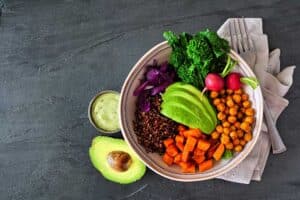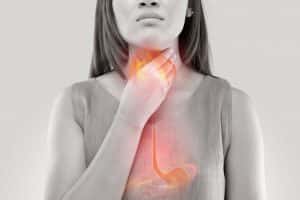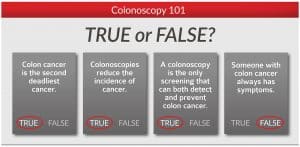Cincinnati GI Patient Newsletter – October 2022
October 2022
5 Tips to Eat More Plants – Your Gut Will Thank You
It’s not just a fad. Research shows that boosting the number of plant-based foods in your diet can improve digestion and help ward off some cancers. An estimated 11% of Americans are either vegetarian or vegan (the latter not eating any animal products), and an additional 10% only occasionally eat meat or fish.

This isn’t to suggest you should stop eating all animal proteins, which include meat, poultry, fish, dairy, and eggs. Rather, it is to advise everyone to increase the number of servings of plant-based foods they eat each day. This includes fruits, vegetables, whole grains, nuts, beans, soy (tofu), and seeds. Research shows just 10% of adults eat enough fruits and vegetables a day, or five servings.
Here are 5 Ways to Get More Plants On Your Plate
- Give plants the star treatment. Crowd the plate with vegetables, grains, and other plant-based foods and give animal proteins a smaller share.
- Prep ahead for longtime ease. Cut up vegetables and some fruits in advance and store them in clear containers.
- Make plants part of the shopping trip. Look at online recipe sites, food magazines, and cookbooks to inspire dishes before hitting the supermarket.
- Schedule “meat-free” dates. The Meatless Monday movement, launched in 2003, has inspired a series of similar campaigns including Sir Paul McCartney’s “Meat-Free Mondays.”
- Opt for solids, even if they’re frozen. Fresh or frozen fruits and veggies are more nutrient-dense than juices.
Click to read more in our blog by Dr. Ganesh Kakarlapudi.
![]()
![]()
 Treatments for GERD When Medication Isn’t Enough
Treatments for GERD When Medication Isn’t Enough
Gastroesophageal reflux disease, or GERD, is estimated to affect at least two of every 10 U.S. adults. So chances are, you know at least two people who live with it.
Let’s say one of those two people is successfully treating the GERD with medication, but the other has found medication doesn’t help. That person may decide to just tolerate the discomfort, but in time that discomfort could lead to more severe GERD and, potentially, damage the throat enough to develop esophageal cancer.
This is what happens to people who develop a complication of GERD called Barrett’s esophagus, a condition that is hard to detect but is highly treatable – even without medication. In fact, a number of non-drug procedures can treat both GERD and Barrett’s esophagus. Learn more from our blog by Dr. Harold Loewenstine.
![]()
Exercise Can Improve Your Gut Health

Ask most people and they will likely agree: exercise is good for your health. But how does it affect your gut health?
Many human studies have shown that moderate-to-vigorous workouts could enhance the diversity of gut bacteria, which is essential for a
healthy gut microbiome. How much exercise? Some research indicates that 18 to 35 minutes a day, plus three resistance sessions a week, can make a difference.
It is still not clear exactly how exercise changes the gut microorganism, but there are theories.
One theory involves lactate, a compound our bodies produce in the muscles during exercise. Researchers believe lactate could fuel certain bacterial species that are good for digestion.
Another potential factor could be changes in the overall immune systems that result from regular exercise. The gut’s own immune system would be especially prone to exercise-induced changes because the gut’s health-promoting microorganisms are in direct contact with the gut’s immune cells.
To learn about more ways exercise can positively affect our gut health, click here to read Dr. Said Nabhan’s blog on the topic.
![]()
Welcome Jenna Ionna, N.P.
A new nurse practitioner recently joined the Cincinnati GI team. Jenna Ionna, NP, comes to us with eight years of experience at the St. Elizabeth Healthcare Transitional Care Unit. She completed her Master’s in Nursing and Family Nurse Practitioner Post-Master’s Certification at Xavier University. Jenna will see patients at some of our hospital locations.



